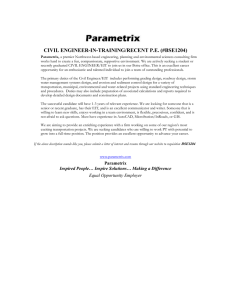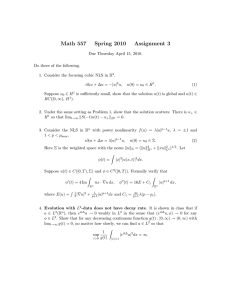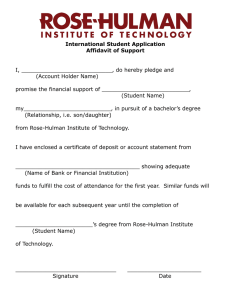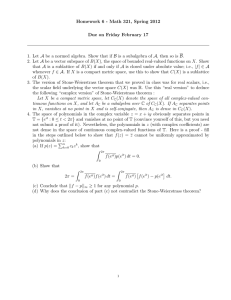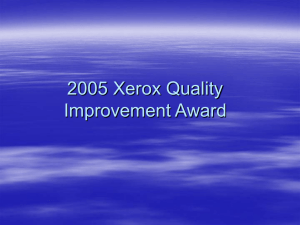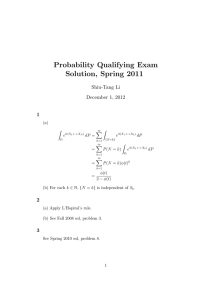POLICY FOR RESPONSIBLE USE OF ROSE-HULMAN COMPUTING FACILITIES o
advertisement
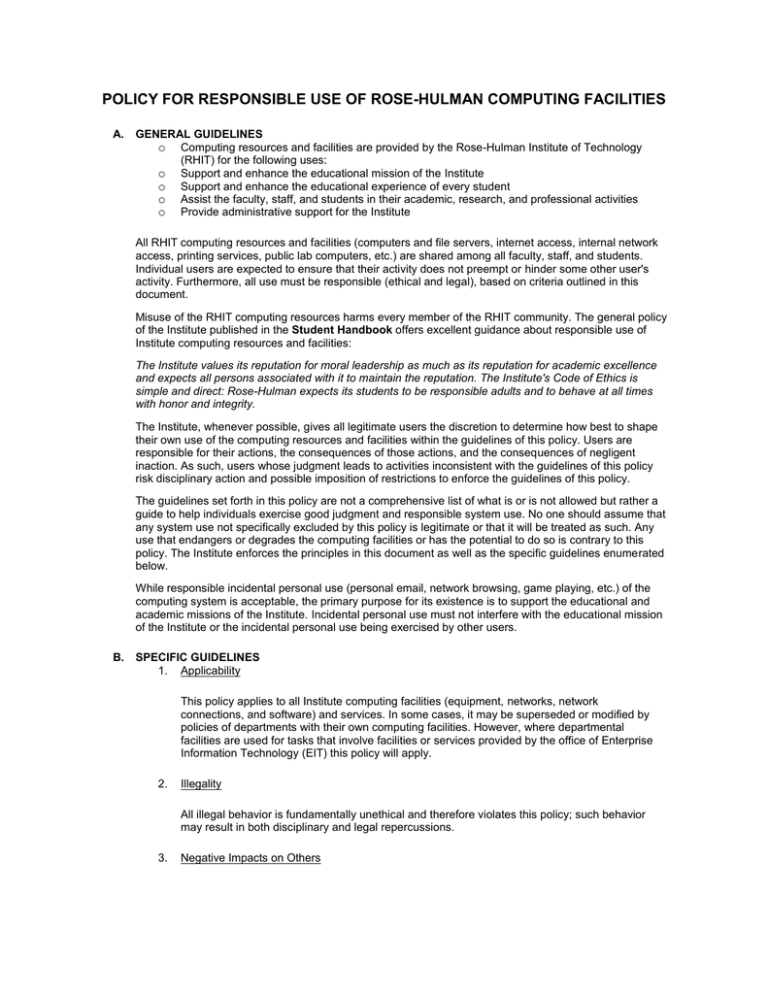
POLICY FOR RESPONSIBLE USE OF ROSE-HULMAN COMPUTING FACILITIES A. GENERAL GUIDELINES o Computing resources and facilities are provided by the Rose-Hulman Institute of Technology (RHIT) for the following uses: o Support and enhance the educational mission of the Institute o Support and enhance the educational experience of every student o Assist the faculty, staff, and students in their academic, research, and professional activities o Provide administrative support for the Institute All RHIT computing resources and facilities (computers and file servers, internet access, internal network access, printing services, public lab computers, etc.) are shared among all faculty, staff, and students. Individual users are expected to ensure that their activity does not preempt or hinder some other user's activity. Furthermore, all use must be responsible (ethical and legal), based on criteria outlined in this document. Misuse of the RHIT computing resources harms every member of the RHIT community. The general policy of the Institute published in the Student Handbook offers excellent guidance about responsible use of Institute computing resources and facilities: The Institute values its reputation for moral leadership as much as its reputation for academic excellence and expects all persons associated with it to maintain the reputation. The Institute's Code of Ethics is simple and direct: Rose-Hulman expects its students to be responsible adults and to behave at all times with honor and integrity. The Institute, whenever possible, gives all legitimate users the discretion to determine how best to shape their own use of the computing resources and facilities within the guidelines of this policy. Users are responsible for their actions, the consequences of those actions, and the consequences of negligent inaction. As such, users whose judgment leads to activities inconsistent with the guidelines of this policy risk disciplinary action and possible imposition of restrictions to enforce the guidelines of this policy. The guidelines set forth in this policy are not a comprehensive list of what is or is not allowed but rather a guide to help individuals exercise good judgment and responsible system use. No one should assume that any system use not specifically excluded by this policy is legitimate or that it will be treated as such. Any use that endangers or degrades the computing facilities or has the potential to do so is contrary to this policy. The Institute enforces the principles in this document as well as the specific guidelines enumerated below. While responsible incidental personal use (personal email, network browsing, game playing, etc.) of the computing system is acceptable, the primary purpose for its existence is to support the educational and academic missions of the Institute. Incidental personal use must not interfere with the educational mission of the Institute or the incidental personal use being exercised by other users. B. SPECIFIC GUIDELINES 1. Applicability This policy applies to all Institute computing facilities (equipment, networks, network connections, and software) and services. In some cases, it may be superseded or modified by policies of departments with their own computing facilities. However, where departmental facilities are used for tasks that involve facilities or services provided by the office of Enterprise Information Technology (EIT) this policy will apply. 2. Illegality All illegal behavior is fundamentally unethical and therefore violates this policy; such behavior may result in both disciplinary and legal repercussions. 3. Negative Impacts on Others The use of computing facilities, either intentionally or through reckless system use, to harm or negatively impact another's legitimate use of computing facilities is unethical. 4. Limited Resources Due to resource limitations, priority is given to purely academic and administrative tasks when resource needs are in conflict. Users whose consumption is excessive during times when resources are critically limited may be subject to EIT regulation. To aid users in moderating their resource consumption, EIT makes available information and statistics regarding individual consumption of resources. 5. Public Equipment Public equipment (workstations, terminals, printers, etc.) is provided by the Institute for use by all students, faculty, and staff. This equipment is provided as a shared resource. If your use of the equipment adversely affects its availability to the community, EIT may restrict your access to these resources. Public equipment is maintained by EIT, and problems with said equipment should be reported to EIT. Under no circumstances should you attempt to move, repair, or service the equipment. 6. Account Responsibility User accounts, like computing facilities, are provided and owned by the Institute. Use of Institute accounts is a privilege, and users are responsible for any unauthorized use made of their accounts or of material stored in their accounts. The intentional attempt to gain unauthorized access to any account is unethical. Because unscrupulous users may still attempt such behavior, users should be aware that no email, files, or data, are perfectly secure. 7. Intellectual Property Theft and Tampering Viewing or using private files, programs or data without authorization is an invasion of privacy, even if that material appears to be legally and/or electronically unprotected. Copying, providing, receiving, using copyrighted material in ways inconsistent with valid licensing agreements is a violation of this policy. Due diligence must be exercised by the creators and users of networks or services which enhance or facilitate file access and/or sharing capabilities beyond those of the core Institutional computer services in order to ensure that copyrighted materials are not copied, provided, received, shared, or used in ways inconsistent with valid licensing agreements. Users must realize that unauthorized access or use of computing resources may be a criminal or civil offense. 8. Electronic Communications Sending fraudulent, harassing or obscene messages and/or materials is unethical, and may be illegal. When in doubt about appropriate message content, consult the general statement published in the Student Handbook and given under the general guidelines above. 9. Information Services Public information services available to users beyond Rose-Hulman campus are not within the jurisdiction of EIT. Faculty or staff questions and concerns about providing such services in a legal and ethical manner should be directed to the Department of Development and External Affairs (DEA); student questions should be directed to the Rose-Hulman Student Government Association (SGA). 10. Commercial Use Use of Institute computer resources for non-Institute commercial purposes in a manner that places a disproportionate draw on aggregate Institute resources requires written authorization and arrangement for suitable compensation to the Institute. Arrangement of such authorization and compensation falls under the jurisdiction of, and should be arranged with, the Vice President of EIT. 11. Disclaimer To provide opportunities for intellectual and personal development campus organizations may offer computer access to material on a variety of topics. However, the availability of material on the server does not imply that RHIT approves or endorses its content. Material is neither censored nor reviewed and therefore may be offensive, inaccurate or simply untrue. Users should apply the skepticism of a responsible adult when accessing such material. Users must be aware that material available through these services may be objectionable to others. C. ENFORCEMENT 1. Access Restriction Systems that are incorrectly configured or compromised by a third party can have adverse effects on the Rose-Hulman network. In these cases EIT may be forced to restrict that system's access to the Rose-Hulman network until the problem is remedied. 2. Malicious Behavior or Use Malicious behavior or use will not be tolerated. If a system is being used to commit such acts, it will be immediately removed from the network. 3. Notification In situations where a system must be removed from the network, or its access to the network must be restricted, EIT will make its best effort to notify the owner of the system before the action occurs. However, in cases requiring immediate solution, EIT reserves the right to take action without notice. In such cases, EIT will notify the owner of the system as soon after the action as possible. D. PROSECUTION AND REDRESS 1. Violations of this policy are treated as disciplinary infractions. Normally, the Dean of Students 2. 3. (or a designated representative from the office of Student Affairs) will first discuss an alleged violation with the individual involved. In the case of disputes, the case will be referred to the Computer Use Policy Advisory Committee for a hearing that will result in a recommendation to the Dean of Students. Then, if necessary, the Dean of Students will take action in accordance with the disciplinary policy of the Institute (see the Discipline and Suspension section of the Academic Rules and Procedures). Actions can result in disciplinary probation, suspension, expulsion, and/or legal action. Institute disciplinary actions may be taken in addition to or regardless of the results of legal action. The Academic Rules and Procedures specify the procedures to be followed for resolving disputes and hearing appeals of decisions for violations of this policy. Users who observe any instance of unethical or illegal computer should take the appropriate action, up to and including notifying the office of EIT. Failure to do so could be viewed as an admission of shared responsibility for such actions and their results. The longer violations of the Computer Use Policy continue, the more harm they do to the Rose-Hulman community.
